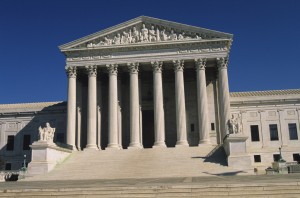On Tuesday, the Supreme Court decide d unanimously on two issues: first, that the Wartime Suspension of Limitations Act (WSLA) applies only to criminal charges and not to civil claims; second, that the first-to-file bar does not apply to new claims once a previous claim has been dismissed. The suit brought forward by whistleblower Benjamin Carter against Kellogg Brown & Root Services, Inc. (KBR) alleged that KBR had fraudulently billed the Government for work they did not perform during the Iraq War. The Court’s holding will in some circumstances reduce the amount of time whistleblowers have to bring a claim under the False Claims Act, but will also allow whistleblowers to bring new claims that contain similarities to prior dismissed suits.
d unanimously on two issues: first, that the Wartime Suspension of Limitations Act (WSLA) applies only to criminal charges and not to civil claims; second, that the first-to-file bar does not apply to new claims once a previous claim has been dismissed. The suit brought forward by whistleblower Benjamin Carter against Kellogg Brown & Root Services, Inc. (KBR) alleged that KBR had fraudulently billed the Government for work they did not perform during the Iraq War. The Court’s holding will in some circumstances reduce the amount of time whistleblowers have to bring a claim under the False Claims Act, but will also allow whistleblowers to bring new claims that contain similarities to prior dismissed suits.
Mr. Carter worked for KBR from January to April of 2005 as a water purification operator. KBR was a defense contractor for the United States during military operations in Iraq where they provided logistical services. Mr. Carter alleges that during his time with KBR, the defense contractor committed fraud by billing the United States Government for water purification services which it either did not perform or performed improperly. The Government declined to intervene, leaving the claim to be pursued by Mr. Carter and his attorneys.
Mr. Carter brought his complaint forward and was initially dismissed under the first-to-file bar because Carter’s case contained claims related to a prior case, Thorpe v. Halliburton, which was pending at the time. Carter appealed the court’s dismissal (Carter I), and while his appeal was pending the Thorpe case was dismissed for failure to prosecute. Upon learning of the Thorpe dismissal, Carter filed a new complaint (Carter II) within the statute of limitations, which the district court dismissed under the first-to-file bar. After the False Claims Act’s six year statute of limitations expired, Carter filed a third complaint (Carter III).
The first question decided by the Court was whether the WSLA applied to both criminal and civil claims, with the Court holding that the WSLA only applied to criminal claims. The WSLA was a product of military conflict; war related funds have been susceptible to fraud throughout military history, and as a remedy Congress has routinely extended the statute of limitations during wars until after the end of the conflicts. Currently, the WSLA extends the statute of limitations until three years after termination of hostilities. The WSLA states that the statute of limitations is extended for any “offense” involving fraud against the United States. “Offense” is most commonly used in reference to criminal acts, and within Title 18 which contains the WSLA, there is no use of “offense” in relation to civil violations. After examining the history and text of the WSLA, the Court concluded that it only applies to criminal cases, and not to civil cases like those brought under the False Claims Act.
The next issue facing the Court was whether the first-to-file bar ceases to apply when a prior related action has been dismissed; the Court held that it did. The False Claims Act does bar similar suits when prior are suits are pending, but the key term is “pending.” Using a textual analysis, the Court found the word pending to mean “remaining undecided; awaiting decision.” The Court further stated that any holding to the contrary would frustrate congressional intent by limiting the Government’s ability to hold those that commit fraud accountable. As such, a dismissed case is not “pending” and no bar to filing a claim. Because of this, the timely Carter claim that was dismissed because of a prior related but dismissed claim, was dismissed in error.
The Court’s decision sends an important message to potential whistleblowers. The narrowing of the WSLA provides defendants committing fraud with more protection from the False Claims Act and will motivate potential whistleblowers to bring claims to the attention of an attorney without delay. The first-to-file ruling has implications on future claims and it is an important victory for whistleblowers. Without this allowance a corporation that defeated a poorly argued claim would be forever insulated from the fraud they committed. The Court’s holding ensures that whistleblowers can continue to come forward in order to hold fraudulent defendants accountable, even when prior whistleblowers have failed.
 Whistleblower Attorneys Blog
Whistleblower Attorneys Blog

